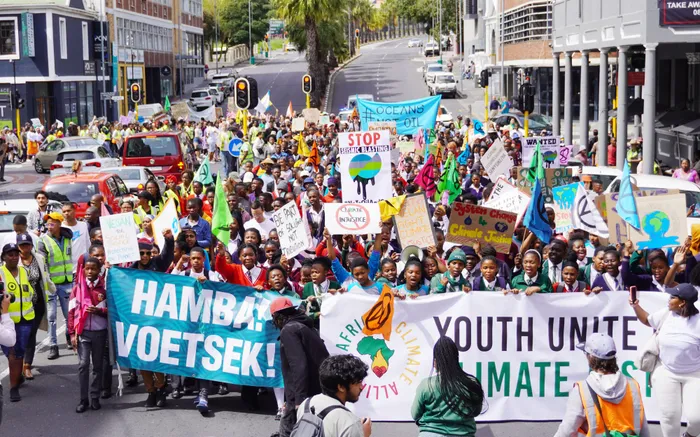
Youth participation must be understood as the process through which young people learn to give, to contribute meaningfully to society.
Image: Tracey Adams/African News Agency (ANA)
“We are now faced with the fact that tomorrow is today. We are confronted with the fierce urgency of now… Over the bleached bones and jumbled residue of numerous civilisations are written the pathetic words: ‘Too late’.” — Martin Luther King Jr, 1967
THE freedom we enjoy today is largely attributed to the supreme sacrifices of countless gallant freedom fighters. Frederick Douglass once said: “Power concedes nothing without a demand. It never did and it never will.”
This is the perfect tribute to those who stood up on June 16, 1976. Their resistance was not just an act of defiance — it was a declaration of humanity in the face of oppression. Only those who have resisted tyranny can truly understand the depth of such sacrifice.
Youth participation must be understood as the process through which young people learn to give, to contribute meaningfully to society. A former juvenile delinquent once said: “Nobody ever treated me like I had anything to give. Just to take. So that’s all I ever did.” That simple realisation changed his life. When youth feel they have something to offer, they begin to matter — not only to others, but to themselves.
Our country finds itself in bewildering times. The political landscape is shifting rapidly, yet no clear path forward emerges. Our “Ship of State” seems caught in a hurricane, without compass or rudder. If we are to survive, we must repair our moral compass and steer toward calmer waters.
The time has come to open a new chapter in our national journey — one led by a new generation armed with innovative ideas and active energy. Young people do not want mere change in administration — they seek transformation in values and standards. They must be encouraged to speak, to vote, and to shape the future.
In his book *Growing Up Absurd*, Paul Goodman argued that when youth are denied meaningful roles in society, they become alienated. Many young people today feel excluded from real political engagement. Elected officials often treat them as pawns, ignoring them until election season and then pandering with shallow promises. No wonder many believe the system is broken beyond repair.
Young people ask: “Will my vote actually matter?” or “I don’t have time to keep up with everything — how can I participate?” These are valid concerns. Until politics becomes relevant to their daily lives, their absence from the political arena will persist.
Renaming June 16 as “Youth Day” risks trivialising the bloodshed and sacrifice of 1976. Calling it a celebration undermines the pain endured by those who stood up against apartheid. Similarly, Sharpeville Day should not be diluted into a generic Human Rights Day. These days are markers of struggle, not party themes.
We must not forget that freedom comes at a price — the price of responsible action. If we cannot find better ways to honour and utilise freedom than to vegetate before screens, then what is its value? We have a rich past to draw from in facing present challenges. There was no apathy in 1976.
Scott Warren, in Generation Citizen, argues that politicians fail to inspire youth because they reduce them to voting blocs rather than engaging them as partners in nation-building. If we continue to ignore young people outside of election cycles, we risk raising a generation that sees no place for itself in public life.
It is time to stop talking “at” youth and start empowering them to lead. They need to be challenged, not coddled. They must be reminded that this is a conquering world, not one meant for passive spectators. Youth, by nature, is adventurous. Let us equip them not only with knowledge, but with purpose.
Democracy thrives when citizens are engaged. Yet, many elected leaders prioritise re-election over reform. What kind of country will we leave behind if we do not prepare the next generation to lead?
Let us ask ourselves: Are we preparing youth to clean up the mess we’ve made — or are we leaving them with a broken inheritance? An old adage says: “If each sweeps before his own door, the village will be clean.”
Today, we risk forgetting this truth. The soul of a nation is shaped by the conscience of its people. Let us guide our youth not merely with words, but with deeds. As the poem *Beowulf* reminds us: “Between two things must a sharp-shield warrior know the difference: words and works.”
The time for empty speeches is over. The situation is dire. It is time for action. This is the challenge that faces our youth today — and it is also the challenge that faces every adult, every leader, and every citizen.
Stephen Grellet put it best: “I expect to pass through this world but once; any good thing therefore that I can do, or any kindness that I can show to any fellow creature, let me do it now.”
How shall our freedom endure? By planting the ideals of liberty in the hearts of the young. There is no other way.
A New York senator once tried to quiet his child by giving her a torn map to reassemble. To his surprise, she completed it quickly. “How?” he asked. She replied: “On the back was a picture of a boy. I figured if I could build the boy right, the world would fall into place.”
Let us build our youth right, and then the world will follow.
* Dr Vusi Shongwe works in the Department of Sport, Arts, and Culture in KwaZulu-Natal and writes in his personal capacity.
** The views expressed here do not reflect those of the Sunday Independent, IOL, or Independent Media.